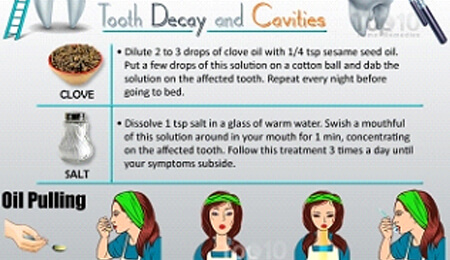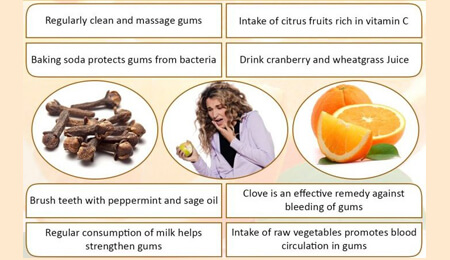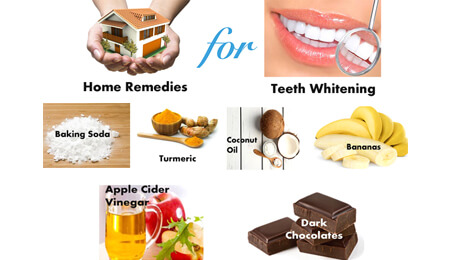+91-080-23352628
+91-080-23214995

 The signs and symptoms of cavities vary, depending on the type and the severity of the problem. Some common symptoms include toothache, tooth sensitivity, mild to sharp pain when eating or drinking, visible holes or pits in the infected tooth, and black, brown or white stains on the tooth’s surface.
The signs and symptoms of cavities vary, depending on the type and the severity of the problem. Some common symptoms include toothache, tooth sensitivity, mild to sharp pain when eating or drinking, visible holes or pits in the infected tooth, and black, brown or white stains on the tooth’s surface.Here are some remedies for tooth decay and cavities-
Clove is one of the most important ingredients for treating any kind of dental issue, including cavities. Due to its anti-inflammatory, analgesic and antibacterial properties, clove can help alleviate pain and prevent the cavity from spreading.
- Dilute 2 to 3 drops of clove oil with 1/4 teaspoon of sesame seed oil. Put a few drops of this solution on a cotton ball and dab the solution on the affected tooth. Repeat every night before going to bed.
- Another option is to gently chew a whole clove to extract its oil. Then keep the clove under your tongue for several minutes.
Salt can also be used to treat cavities due to its antiseptic and antibacterial properties. It can reduce inflammation, ease pain, draw out any infection and prevent growth of bacteria in the mouth.
- Dissolve 1 teaspoon of salt in a glass of warm water. Swish a mouthful of this solution around in your mouth for 1 minute, concentrating on the affected tooth. Follow this treatment 3 times a day until your symptoms subside.
- Alternatively, mix 1/2 teaspoon of salt and a little mustard oil or lemon juice to make a paste. Massage the gums gently with this paste for a few minutes, then gargle with warm water. Repeat twice daily for a few days to kill bacteria.
Oil pulling is an age-old practice that can reduce cavities as well as bleeding gums and bad breath. It helps clean the mouth of harmful bacteria that are responsible for different types of dental problems.
- Put 1 tablespoon of sesame oil in your mouth.
- Gently swish it around for about 20 minutes.
- Spit it out. Avoid gargling or swallowing the oil.
- Rinse your mouth out with warm water. Use salt water for added antimicrobial benefits.
- Brush your teeth as usual.
- Do this daily in the morning, on an empty stomach.
Being rich in antibacterial as well as antibiotic properties, garlic is often recommended for tooth decay and cavities. It can also provide respite from pain and promote healthier gums and teeth.
- Prepare a paste from 3 to 4 crushed garlic cloves and 1/4 teaspoon of rock salt. Apply it on the infected tooth. Leave it on for 10 minutes before rinsing with a mouthwash. Do this twice daily for a few weeks to reduce cavities.
 Home remedies are a cheap and effective way to treat gingivitis. It’s essential to treat the plaque before it becomes tartar. You may also wish to increase the frequency and duration of brushing and flossing.
Home remedies are a cheap and effective way to treat gingivitis. It’s essential to treat the plaque before it becomes tartar. You may also wish to increase the frequency and duration of brushing and flossing.
The results of a various studies showed that using a salt water rinse can be very beneficial in healing gums inflamed by gingivitis. Salt is a natural disinfectant that helps your body to heal itself.
Lemongrass oil or Aloe Vera oil was found to be effective mouthwash at reducing plaque and gingivitis levels.
To use a lemongrass mouthwash:
- Dilute two to three drops of lemongrass essential oil in a cup of water.
- Swish the solution in your mouth for up to 30 seconds.
- Spit out the solution.
- Repeat two to three times per day.
Coconut oil contains lauric acid, which has anti-inflammatory and antimicrobial properties. Researchers found that using coconut oil for oil pulling significantly reduces plaque and signs of gingivitis.
Cloves and turmeric gel application prevent plaque and reduce inflammation. That’s because they have antiviral and antioxidant properties. They may also help to relieve pain.

Baking soda has natural whitening properties, which is why it's a popular ingredient in commercial toothpaste.
It's a mild abrasive that can help scrub away surface stains on teeth.
Hydrogen peroxide is a natural bleaching agent that also kills bacteria in your mouth.
In fact, people have been using hydrogen peroxide for years to disinfect wounds because of its ability to kill bacteria.
Acetic acid, which is the main active ingredient in apple cider vinegar, effectively kills bacteria and is a good bleaching agent.
The acetic acid in vinegar has the potential to erode the enamel on your teeth. For this reason, you should not use apple cider vinegar every day. You should also limit the amount of time that apple cider vinegar is in contact with your teeth.
However, most dentists offer whitening treatments that are much stronger than these natural remedies. They involve bleaching the teeth, which may be more effective for severe tooth discoloration.
When a tooth is broken or displaced, don’t worry too much. If quick action is taken to care for your broken tooth, it should be easy to heal. If the tooth is knocked out, try to place the tooth back in its socket while waiting to see your dentist.
Next, rinse your mouth of any blood or other debris that might be in your mouth. It is also important to place a cold compress on the cheek near the injury for further relief from swelling and irritation. If you cannot place the tooth back in its socket, hold the dislocated tooth by the crown and place it in a container of warm milk, saline, or the person’s own saliva. Make sure to keep it in the solution until you arrive at the emergency room or dentist’s office.
When a tooth is fractured, rinse with warm water and apply a cold pack or compress to the cheek to prevent swelling and irritation. You may also use ibuprofen to help control the swelling as well. If it is a minor fracture, the tooth can be sanded or restored by our dentist if the pulp is not severely damaged. A fractured tooth needs prompt attention, so don’t wait before coming into our office for toothache care.

Dr. Prashanth Kumar
He graduated from Government Dental College, Bangalore in 1999. Completed his Diplomat in Orthodontics from ICNOG university, Italy. He is also a fellow in Implant and Esthetic Dentistry. He is an active Member of the International Orthodontic Association and Indian Dental Association. He is also an authorized dental surgeon to KPCL and BHEL.
Dr. Soujanya Prashanth
She started her practice from the year 2004 and with that came the establishment of Procare Dental Clinic , she has evolved the clinic from the basic requirement to advanced facilities to each and every patient.

Just Make An Appointment
Prashanth Dental Clinic

Opposite Vijayanagar Metro
Station ( Gate A)
Vijayanagar, Bangalore-560040
Procare Dental Clinic

Bangalore-560072
Copyright © All Rights reserved | Privacy Policy



